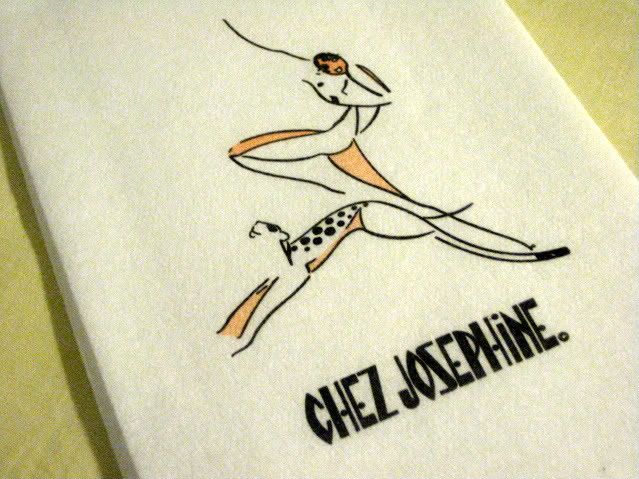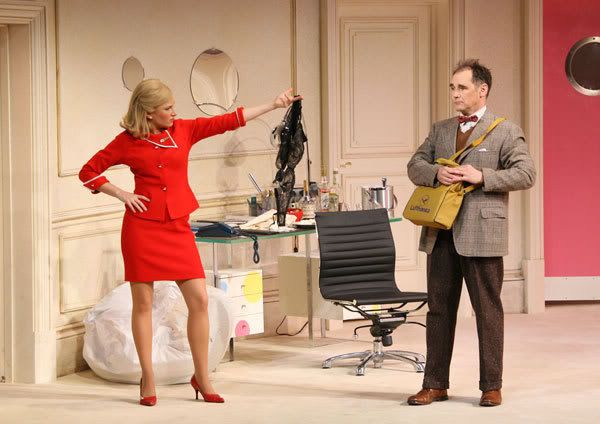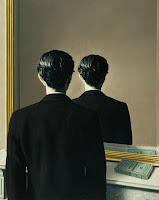The bus ride to New York, which normally takes four hours and change, takes seven with traffic. My friend A had booked dinner the week before and was afraid we might miss our reservation, but we finally arrive in Chinatown with time to spare. I change shirts on the subway (much to A’s disbelief) and my pants at a nearby Starbucks. We then meet up with K, A’s boyfriend, and head over to Chez Josephine, the first stop on our Restaurant Week splurge; it’s A and K’s belated birthday treat to me.
 Chez Josephine is a swank looking bistro dedicated to the Americaine in Paris who became famous for her dancing career in the twenties and thirties. The first thing we hear upon entering is the pianist who’s actually quite good and has a voice perfect for crooning standards. Sadly, the entertainment impresses more than the food. We all order menu items prix fixe. While the beet salad is a delightful starter with a nice play of textures, my roast chicken is overcooked and my lemon crème brulée just par. Nonetheless, I enjoy the ambiance and whole experience and wish I hadn’t left my camera in the car. At night, the decor of turquoise walls and chandeliers in tangerine really jazzes up the space.
Chez Josephine is a swank looking bistro dedicated to the Americaine in Paris who became famous for her dancing career in the twenties and thirties. The first thing we hear upon entering is the pianist who’s actually quite good and has a voice perfect for crooning standards. Sadly, the entertainment impresses more than the food. We all order menu items prix fixe. While the beet salad is a delightful starter with a nice play of textures, my roast chicken is overcooked and my lemon crème brulée just par. Nonetheless, I enjoy the ambiance and whole experience and wish I hadn’t left my camera in the car. At night, the decor of turquoise walls and chandeliers in tangerine really jazzes up the space.
As a continuation of this French theme, we catch the matinée of Boeing Boeing the next day all thanks to A. It is this year’s Tony winner for Best Play Revival and deservedly so. The cast is amazing and the story happens to speak to my research concerning the emergence of aesthetic and political internationalism (because even on holiday, I’m thinking about school).
Boeing Boeing, by Marc Camoletti, takes off from the advent of passenger aircraft during the 1960s. In this period farce, faster engines have made it possible to boink multiple “air hostesses” from different airlines so long as their paths never cross. As Bernard (Bradley Whitford), the architect of this diplomatic venture, explains:
Pure mathematics, everything organized, regulated, and working to the precise second. The earth turns on its axis and my three fiancées wheel above the earth. One this way. One that. One towards the sun. One towards the moon. And eventually, they all come in home to me. No alarms. No surprises. It’s geometric my dear Robert, so exact as to be almost poetic. And here I sit in the middle the typical example of polygamous despotism.
The center of the universe is a beautiful standing set featuring seven doors (making for plenty of opportunities to hide and appear) and furnished with period pieces such as Barcelona chairs and a glass desk. Rose, lemon, and cerulean accents —they rhyme with the air hostess uniforms—recall the pastel realms of French New Wave filmmaker Jacques Demy (cf. Les Demoiselles de Rochefort), while the modernist counterpoint between squares and circles is a fitting correlate for the sexual antics on stage.
 Everything runs like clockwork until the planes outrun Bernard’s timetables. We watch in anticipation of the inevitable collision as Bernard, Robert, and Berthe (the maid) struggle to keep the fiancées from finding out about each other. The three fiancées Gloria (Kathyrn Hahn), Gabriela (Gina Gershon), and Gretchen (Mary McCormack)—alliteration is insurance against memory lapse—are coruscating caricatures of Americans (worshippers of kink, ketchup, and money), Italians (the best-dressed sentimentalists), and Germans (hardcore taskmasters), respectively. And while their accents are stiltedly stereotypical, they execute them with so much élan and physicality that you are too busy laughing to care. The one actor who manages to pull off the foreign accent is Mark Rylance as Robert. The Brit, who won this years Tony for Best Actor, is hilariously on point as the bashful businessmen from Wisconsin turned horndog à la Bernard. Christine Baranski’s French is atrocious, but her Berthe scores points for the crabbiness befitting a soubrette.
Everything runs like clockwork until the planes outrun Bernard’s timetables. We watch in anticipation of the inevitable collision as Bernard, Robert, and Berthe (the maid) struggle to keep the fiancées from finding out about each other. The three fiancées Gloria (Kathyrn Hahn), Gabriela (Gina Gershon), and Gretchen (Mary McCormack)—alliteration is insurance against memory lapse—are coruscating caricatures of Americans (worshippers of kink, ketchup, and money), Italians (the best-dressed sentimentalists), and Germans (hardcore taskmasters), respectively. And while their accents are stiltedly stereotypical, they execute them with so much élan and physicality that you are too busy laughing to care. The one actor who manages to pull off the foreign accent is Mark Rylance as Robert. The Brit, who won this years Tony for Best Actor, is hilariously on point as the bashful businessmen from Wisconsin turned horndog à la Bernard. Christine Baranski’s French is atrocious, but her Berthe scores points for the crabbiness befitting a soubrette.
Though Boeing Boeing is very much a period piece (when was the last time you received a telegram?), the stunning cast and delicious plot makes for world class entertainment.
July 26th, 2008
Since passing the big 2 5, I find birthdays more depressing than ever. Getting older loses its appeal when you have no new milestones to celebrate and your special day arouses the same dread as a deadline: “This paper is due in three hours and I haven’t even started!” In college, we had finals, recitals, and even p.e. to boost our self-esteem. But in grad school, there’s what? Teaching evaluations? Awesome powers of interpretation? The only milestones in the academy are getting hired and getting published. That and the dissertation, and I ain’t quite there yet.
Today’s gloom was exacerbated by thunderstorms. This morning, I had to splash my way to the hospital. It’s been a month since I began taking this drug called isotretinoin to treat nodular acne. I’m happy with my chapped lips and inability to cry, though dread the more adverse side effects ranging from organ damage to suicidal depression. If that isn’t bad enough, treatment requires a pledge of abstinence for six months (the treatment period is five) since the drug causes serious birth defects in unborn children. A paper chad with the X’ed out icon of a pregnant woman stands between me and each of the tiny, orange pills; I’ve punched out 60 so far. Given the potency of the drug, I have to get a blood test every pill cycle just to make sure the drug isn’t messing up my system. Then I’m cleared for the next 30-day supply to be picked up the next day. Today was day thirty, my first blood test and my 26th birthday.
When I got home, it was still thundering outside, and I felt like reading some Beckett, who, I remembered, wrote a play for such occasions. Krapp’s Last Tape is a one-act about the tragedy of selfhood, but it is also a play about birthdays.
At the age of 69, Krapp remains single and pretty much feels like his name. To pass the time, he drinks a lot (backstage) and downs bananas (onstage) in a ritual suggestive of auto-fellatio. Since his twentieth birthday, he has kept an audio diary on a set of tape reels. Every birthday, he plays entries from past birthdays before recording his latest reflections on a fresh tape. You could say that Krapp was a podcasting pioneer.
His annual reports, however, bring little joy to the listener. He expresses little remorse for his mother’s death and recalls being accused of harassment after trying to flirt with a lady outside his mother’s room. He regrets calling off a love affair with a past flame. These events are never relayed in linear fashion. Longing, frustration, envy, make him rewind and fast-forward, stop, start, and linger on certain tapes. And it is through his attempts to connect with his past selves that we begin to understand his failure to connect with others. At one point, he stops the tape to look up the meaning of an unfamiliar word uttered by a Krapp forty years his junior:
[reading from a dictionary] State — or condition — of being — or remaining — a widow — or widower. [Looks up. Puzzled.] Being — or remaining? … [Pause. He peers again at dictionary. Reading.] “Deep weeds of viduity” … Also of an animal, especially a bird … the vidua or weaver-bird … Black plumage of male … [He looks up. With relish.] The vidua-bird!
Why does Krapp go from puzzled to delighted in the blink of a word? Is it that he’s tickled by the tritone of meanings here. While viduity denotes forlornness, its sound evokes a creative being (“weaver bird”), which appeals to the writer’s sagging ego (“plumage of male”). But I also hear the resonance of vidua and viduity with individual. Individuals are not in-divisible, as the etymology would have us believe. Rather, each person, like a tape reel in a box of many tape reels, remains vidual, alienated from his past selves.
 Krapp’s Last Tape is like the dramatic counterpart to Magritte’s La Reproduction Interdite (Not to be Reproduced, right), in which a man stares into a mirror and only sees the back of himself. So how does one escape the abyss? I suppose it requires a leap of sympathy, though that only leads to rejection in Krapp’s case, or else the willingness to make oneself vulnerable for the sake of making a connection. And yet, despite seeming to grasp the import of this passage, here I remain in my weeds of viduity….
Krapp’s Last Tape is like the dramatic counterpart to Magritte’s La Reproduction Interdite (Not to be Reproduced, right), in which a man stares into a mirror and only sees the back of himself. So how does one escape the abyss? I suppose it requires a leap of sympathy, though that only leads to rejection in Krapp’s case, or else the willingness to make oneself vulnerable for the sake of making a connection. And yet, despite seeming to grasp the import of this passage, here I remain in my weeds of viduity….
…until the next day, when my friend and I take the bus to New York and the real party begins. The moral of this story: like deadlines, birthdays are best honored one day late.
July 24th, 2008
 Chez Josephine is a swank looking bistro dedicated to the Americaine in Paris who became famous for her dancing career in the twenties and thirties. The first thing we hear upon entering is the pianist who’s actually quite good and has a voice perfect for crooning standards. Sadly, the entertainment impresses more than the food. We all order menu items prix fixe. While the beet salad is a delightful starter with a nice play of textures, my roast chicken is overcooked and my lemon crème brulée just par. Nonetheless, I enjoy the ambiance and whole experience and wish I hadn’t left my camera in the car. At night, the decor of turquoise walls and chandeliers in tangerine really jazzes up the space.
Chez Josephine is a swank looking bistro dedicated to the Americaine in Paris who became famous for her dancing career in the twenties and thirties. The first thing we hear upon entering is the pianist who’s actually quite good and has a voice perfect for crooning standards. Sadly, the entertainment impresses more than the food. We all order menu items prix fixe. While the beet salad is a delightful starter with a nice play of textures, my roast chicken is overcooked and my lemon crème brulée just par. Nonetheless, I enjoy the ambiance and whole experience and wish I hadn’t left my camera in the car. At night, the decor of turquoise walls and chandeliers in tangerine really jazzes up the space. Everything runs like clockwork until the planes outrun Bernard’s timetables. We watch in anticipation of the inevitable collision as Bernard, Robert, and Berthe (the maid) struggle to keep the fiancées from finding out about each other. The three fiancées Gloria (Kathyrn Hahn), Gabriela (Gina Gershon), and Gretchen (Mary McCormack)—alliteration is insurance against memory lapse—are coruscating caricatures of Americans (worshippers of kink, ketchup, and money), Italians (the best-dressed sentimentalists), and Germans (hardcore taskmasters), respectively. And while their accents are stiltedly stereotypical, they execute them with so much élan and physicality that you are too busy laughing to care. The one actor who manages to pull off the foreign accent is Mark Rylance as Robert. The Brit, who won this years Tony for Best Actor, is hilariously on point as the bashful businessmen from Wisconsin turned horndog à la Bernard. Christine Baranski’s French is atrocious, but her Berthe scores points for the crabbiness befitting a soubrette.
Everything runs like clockwork until the planes outrun Bernard’s timetables. We watch in anticipation of the inevitable collision as Bernard, Robert, and Berthe (the maid) struggle to keep the fiancées from finding out about each other. The three fiancées Gloria (Kathyrn Hahn), Gabriela (Gina Gershon), and Gretchen (Mary McCormack)—alliteration is insurance against memory lapse—are coruscating caricatures of Americans (worshippers of kink, ketchup, and money), Italians (the best-dressed sentimentalists), and Germans (hardcore taskmasters), respectively. And while their accents are stiltedly stereotypical, they execute them with so much élan and physicality that you are too busy laughing to care. The one actor who manages to pull off the foreign accent is Mark Rylance as Robert. The Brit, who won this years Tony for Best Actor, is hilariously on point as the bashful businessmen from Wisconsin turned horndog à la Bernard. Christine Baranski’s French is atrocious, but her Berthe scores points for the crabbiness befitting a soubrette.